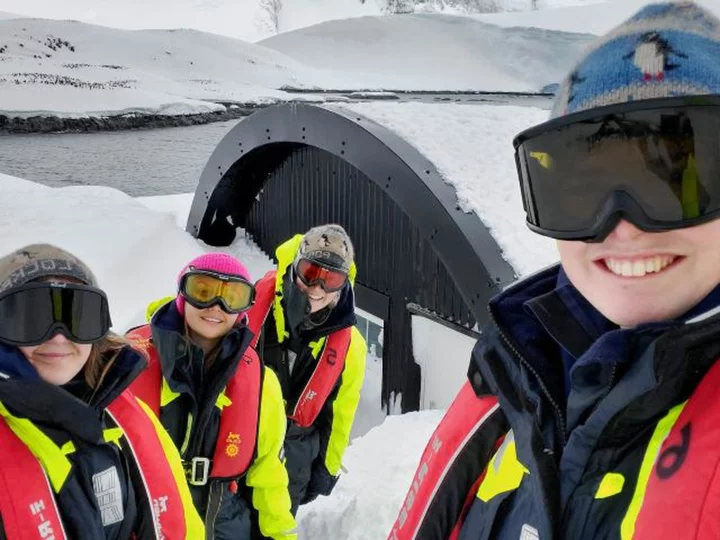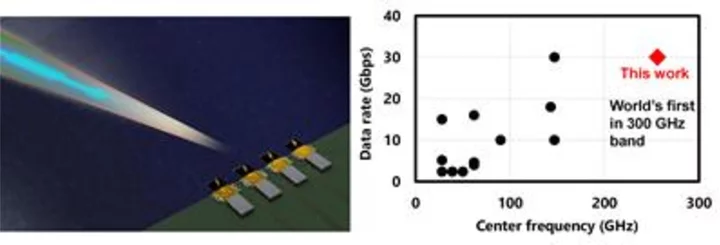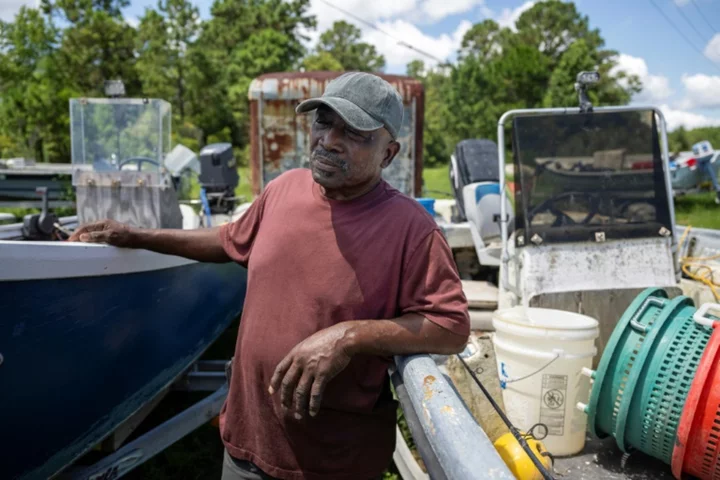When this year's all-woman team arrived on Antarctica's Goudier Island to run the world's most remote post office, it was shovels they needed rather than stamps.
They'd traveled some 8,000 miles from the UK, by plane and boat, and Britain's Royal Navy were already on hand to help them dig out their new home at the Port Lockroy scientific base, which was buried up to four meters deep under several tonnes of December snow.
It wasn't just the frozen wastes that first struck postmaster Clare Ballantyne, who at 23 years old was the baby of the four-woman group. It was that "there's penguins everywhere."
More than a thousand Gentoo penguins live on this tiny island on the western side of the Antarctic peninsula, around the size of a soccer field. Since 1944, when the UK's first permanent Antarctic base was established here, it's also become a haven for explorers, scientists and -- in recent years -- tourists.
As well as the post office, there's a museum and gift shop. In the 2022/23 season, nearly 16,000 visitors from more than 200 ships passed through, making this one of the busiest places in the "frozen continent."
Each year, a team is selected to run and maintain the site from November to March, or summertime in the southern hemisphere. Around 4,000 people applied for this, the first post-Covid season, but just four made the cut: Ballantyne, base leader Lucy Bruzzone, wildlife monitor Mairi Hilton and shop manager Natalie Corbett.
The job also involves counting penguins: The scientific data they gather on the Gentoos' breeding patterns is part of a decades-long study of the colony.
'Living on top of each other'
The chosen candidates beat out odds of one in a thousand -- but this is not a cozy posting. For five months, they share a single bedroom. There's no running water, no internet and very little leisure time: just one day off every two weeks.
"It's a very intense experience," says Vicky Inglis, field operations coordinator for the UK Antarctic Heritage Trust, "living on top of each other, nowhere you can escape."
And then, of course, there's the pungent pong of penguins. "At a certain point in the season, the snow goes and it's not mud -- it's all guano," says Inglis. Guano, in layman's terms, is seabird poop -- and there's a lot of it.
Food is largely canned or dried, other than what comes off the cruise ships that visit. These expedition ships -- typically small 200-passenger craft, rather than the behemoths you might see down in the Med -- also offer the chance to have a luxurious hot shower.
In their snatches of leisure time, the 2023 team say on their blog, "We spend quite a bit of the day sleeping! Then we'll go for a walk around the island, very slowly to absorb everything -- the smaller things you wouldn't usually notice in particular -- limpets, moss, starfish and krill. We also take photos, read books and chat -- much like the original men who lived on base."
'Cheeriness goes a long way'
When it comes to choosing candidates, "there is no recipe we can follow," says Camilla Nichol,CEO of the trust. "It's about your ability to work together as a team. Cheeriness goes a long way, being able to see the light in life and resolve problems quickly."
What the posting lacks in creature comforts, it makes up for in sublime wonder. "Antarctica is like nowhere else on Earth," says Nichol. "The scale of it is so vast, it's so pristine, the air is so clear. Suddenly you feel very small as a member of the human race. There are forces, there is nature; the environment is so much more vast than we are."
Going to a continent so little touched by humans made Nichol realize the human responsibility to look after it. "I came away very much with a sense of purpose."
Recruitment recently closed for the 2023/24 season and the newest batch of recruits will set off at the end of this year. They'll be continuing an important scientific legacy, says Nichol. "We're representing and telling a story of a period of Antarctic history that is little told," but "it speaks to everything we worry about today.
"It's the birthplace of climate science in Antarctica. It's the place where discoveries are made, which we can act on here." The hole in the ozone layer was discovered in Antarctica in 1985 by a junior researcher for the British Antarctic Survey. It led to the Montreal Protocol and the banning of CFCs -- proof that environmental disasters can be halted when nations work together.
The tourism boom
Nichol notes that there has been "a bit of a decline in recent years in the breeding success" of the Gentoo penguins, but says "the causal connection is the tricky bit." While climate change is probably "the biggest driver," they also need to carefully examine if there's a "human element" as well.
Antarctica tourism has boomed significantly in the past couple of decades, but Nichol is quick to point out that the Antarctic plains are still a big area -- larger than the UK. There aren't legally enforced limits on tourism, she says, but it's very strictly managed through the IAATO (International Association of Antarctica Tour Operators) and also by the Antarctic Treaty permitting system.
There are legal codes for everything from the polar worthiness of the ships, to waste and water management to biosecurity. Says Nichol, "It's a regulated industry, it is growing and we're expecting a bumper year this year."









